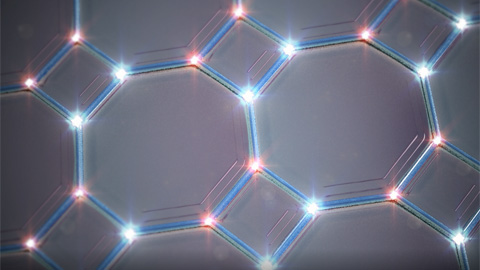The ICN2 and Microsoft expand partnership in quantum computing research

10/10/2019
Interest in and awareness of quantum computing has grown with increasing global investment in the quest to build a quantum computer. Promising mindboggling processing capacities and speeds, quantum computers will fundamentally change our economy, industry, and everyday life. It therefore comes as no surprise that leading information technology and electronics companies are pursuing related research internally and collaboratively with third parties, from the mathematical algorithms needed to control and interpret quantum bits (or qubits - the processing units) to the engineering of devices at the nanoscale that are needed to make this revolution possible.
The ICN2 is deepening its strategic research partnership with Microsoft, an acknowledged world leader in the development of quantum computing technology. Microsoft Quantum Labs have been established around the globe by Microsoft; these are dedicated centres working on every aspect of developing a quantum computer, from foundational physics to the design of new software tools to fully exploit the potential of quantum computing.
Microsoft Quantum Materials Lab Copenhagen, in particular, has been working on designs for new materials that can be used to enable quantum devices. Specifically, one line of research involves the development of hybrid heterostructures that support the all-important Majorana fermions, as demonstrated at both Microsoft Quantum Lab Copenhagen and Microsoft Quantum Lab Delft.
Majorana fermions are particles of the fermion class that have the characteristic of being their own antiparticles. In condensed matter physics, Majorana bound states can appear under specific conditions: special quantum states that can be used as qubits. The research carried out by Microsoft --which the ICN2 will contribute to-- is based on the development of semiconductor – superconductor hybrid nanowires, at the edges of which Majorana bound states can generate.
In order to fully understand and exploit the potential of these new structures, they must first be analysed and understood at the atomic level. The ICN2 Advanced Electron Nanoscopy Group, led by ICREA Prof. Jordi Arbiol, will provide its expertise in electron microscopy and related spectroscopies to perform measurements and analysis of the complex structure and physical properties of these Majorana nanowires. By doing so, they will shed light on the structure of these and on how they respond at the atomic level to external stimuli.
About the ICN2
The Institut Català de Nanociència i Nanotecnologia (Catalan Institute of Nanoscience and Nanotechnology - ICN2) is devoted to the generation of knowledge, materials and devices in the broad fields of ICT, health, energy and the environment. Its expertise lies at the nanoscale, where new properties, interactions and ways to exploit them in everyday life are being discovered all the time. Among its goals is to bring together scientists from diverse backgrounds in the pursuit of better science, better training and better outreach to society, while also seeking out new ways to engage with local and global industry.
The institute was accredited as a Severo Ochoa Centre of Excellence in 2014, and the Spanish Ministry of Science, Innovation and Universities renewed this status in 2018. Among its trustees are the Generalitat of Catalonia, the Spanish National Research Council (CSIC) and the Autonomous University of Barcelona, where it is based. The ICN2 is a CERCA Center and also one of the founding members of the Barcelona Institute of Science and Technology (BIST) and the Graphene Flagship.
In the quantum research field, the ICN2 is involved in the new Quantum Flagship promoted by the European Commission, and a number of Groups develop research lines shedding light on the quantic behaviour of matter and the application opportunities generated by this disruptive knowledge. A Qubit studied at the ICN2 facilities was available in a module designed in collaboration with the Barcelona Supercomputing Center for the Quantum exhibition curated by the Centre de Cultura Contemporània de Barcelona (CCCB).